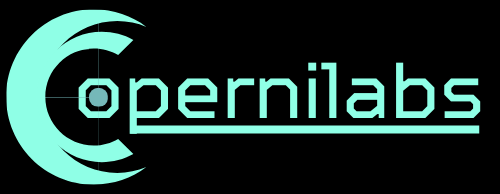The maintenance of terrestrial infrastructure is undergoing a major transformation thanks to the integration of artificial intelligence (AI). This evolution marks the shift from reactivity to proactivity, where AI analyzes sensor data and maintenance histories to predict failures before they even occur. This article explores the scope of this transformation, the associated benefits and highlights the leading role of Copernilabs in this revolution.

THE WINDFALL FOR NEW SPACE
The maintenance of space-related terrestrial infrastructure is critical to ensure business continuity. AI, by leveraging sensor data and maintenance histories, enables proactive intervention by anticipating maintenance needs even before failures occur.
THE BENEFITS
Minimization of Downtime
AI provides the ability to anticipate maintenance needs, reducing downtime and ensuring business continuity.
Maintenance Cost Optimization
By predicting failures, AI enables cost optimization by intervening before a failure occurs.
THE IA WINDFALL SEEN BY COPERNILABS
At Copernilabs, the vision of maintenance is always one step ahead. Our AI solutions are specifically
designed to anticipate maintenance needs, thus ensuring optimal management of land infrastructure. Copernilabs’AI technology predicts maintenance needs, ensuring reliability and reduced downtime.
SIGN UP to access to copernilabs’ vision
Join us for a detailed journey into this revolutionary technology. Sign up now to unlock exclusive content that will take you into the heart of space innovation!
The AI Revolution at Copernilabs
At Copernilabs, the vision of maintenance is always one step ahead. Our AI solutions are specifically designed to anticipate maintenance needs, thus ensuring optimal management of land infrastructure. Copernilabs’ AI technology predicts maintenance needs, ensuring reliability and reduced downtime.

Machine Learning (ML)
- Predictive Model Analysis: ML allows Copernilabs to analyze large historical and real-time data sets
to identify predictive patterns. These models anticipate potential failure patterns, which is crucial for
proactive maintenance.
- Intervention Optimization: By relying on sophisticated ML algorithms, Copernilabs can optimize
intervention times by predicting maintenance needs. This results in more efficient use of resources
and a significant reduction in downtime.
- Dynamic Adaptation: ML allows Copernilabs to create adaptive models that evolve over time. This ability to adjust to changes in the environment of land infrastructures ensures that maintenance is always aligned with real conditions.

Deep Learning (DL)
- In-Depth Understanding of Complex Data: Complex data, such as that from cameras and lidar, is
interpreted in depth with DL. This allows Copernilabs to detect weak signals or non-obvious anomalies at lower levels, improving the accuracy of predictive maintenance.
- Unstructured Data Processing: DL excels at processing unstructured data, which is crucial in the context of land infrastructure maintenance. This allows Copernilabs to leverage data from a variety of sensors without being limited by pre-established formats.
- Enhanced Computer Vision: By integrating DL, Copernilabs’ computer vision becomes moresophisticated, allowing for finer analysis of visual data. This enhances the ability to visually identify early signs of failures.
LOOKING AHEAD
Beyond the current transformation, Copernilabs is looking at future developments to further strengthen the predictive and proactive maintenance of land-based infrastructure. Research and development initiatives are underway to incorporate emerging technologies such as contextual intelligence and federated learning. These advances aim to make CopernilabS’AI even more adaptable and responsive to the rapid changes in the space environment.
Collaboration and Partnerships
Copernilabs encourages collaboration with other industry players and strategic partnerships.
Copernilabs’vision is to create an ecosystem where data can be securely shared between different
entities, fostering a more holistic understanding of maintenance challenges and enabling even more
efficient solutions.
Training and Adoption
Copernilabs recognizes the importance of training to maximize the benefits of AI in the maintenance
of terrestrial infrastructure. Customized training programs are offered to help companies understand
and effectively integrate these new technologies, ensuring a smooth transition to a proactive
approach.
Evolution of Sensors and AI
The company remains attentive to developments in the field of sensors and AI, continuously investing in research to exploit technological advances. The integration of more advanced sensors and the constant improvement of AI algorithms will allow Copernilabs to remain at the forefront of innovation in the field of land infrastructure maintenance.
Adaptation to Environmental Standards
Amid growing sustainability concerns, Copernilabs is committed to developing solutions that meet
the highest environmental standards. The integration of ecological criteria into predictive models will
contribute to a more responsible management of terrestrial infrastructure, aligned with overall environmental objectives.
Final Conclusion
Predictive and proactive maintenance of land infrastructure is a reality thanks to the innovation of companies such as Copernilabs. By investing in AI and constantly pushing technological boundaries, Copernilabs is paving the way for more efficient, cost-effective and sustainable management of space operations. Companies that want to engage with Copernilabs are embracing not only the present, but also the future of land infrastructure maintenance. The transformation continues, and Copernilabs remains at the forefront of this evolution.

Impact of Copernilabs on the Sector
Copernilabs’approach revolutionizes the predictive and proactive maintenance of terrestrial infrastructures by merging heterogeneous data from sensors such as radar, RF, camera, radiating cable, lidar, powered by AI algorithms. This approach enables informed decision-making, promoting the reliability and sustainability of space operations.

Scientific Expert Opinion
Copernilabs experts emphasize the critical importance of key technologies such as Machine Learning (ML), Deep Learning (DL), computer vision, and other AI techniques in their approach. These technologies play a critical role in enabling advanced analysis of sensor data, providing a proactive view of maintenance needs.
READY TO REVOLUTIONIZE revolutionize your approach to ground infrastructure maintenance
Contact Copernilabs to find out how their AI solutions can optimize your operations. The fusion of heterogeneous data and the intelligent use of AI are the keys to ensuring the reliability and sustainability of your space operations.
